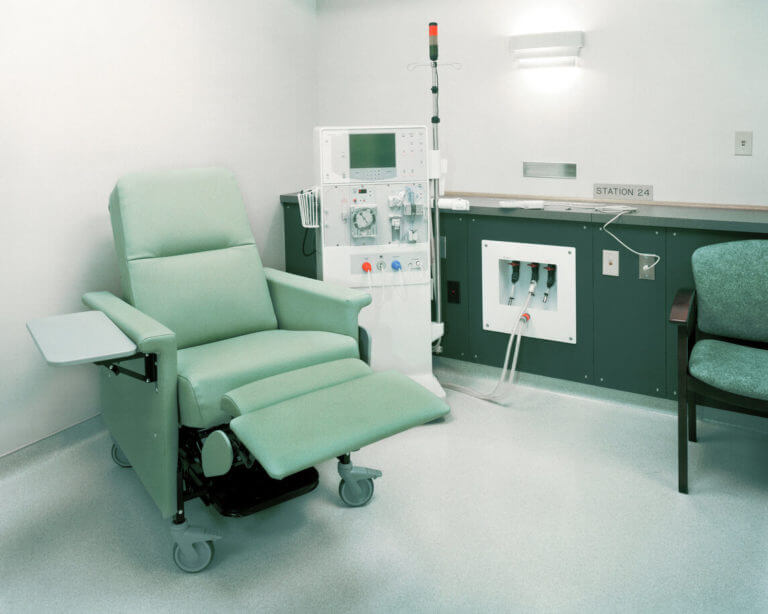
Finding a dialysis center near you is an important step in managing kidney failure. Starting dialysis can feel like a lot to handle, but your first visit will help you understand what to expect. The skilled team will guide you through every step.
Kidney doctors work closely with the dialysis staff to ensure your care is thorough and fits your needs.
This guide explains what happens during your first visit. We will also look at the role of a dialysis center and what to expect from treatment, including the following:
- Dialysis Center Purpose: Centers provide expert kidney treatment with staff support and patient education.
- Treatment Process: Hemodialysis includes monitoring your health, managing your blood, and handling side effects.
- Quality and Support: Pick certified centers with skilled staff for the best care and results.
What is the Purpose of a Dialysis Center Near You?
A dialysis center helps people with kidney failure. This treatment removes waste and extra fluid from the blood when the kidneys cannot do it. They offer two types of treatment: hemodialysis and peritoneal dialysis.
The care team includes doctors, nurses, dietitians, and social workers. Nurses oversee your treatment, and dietitians guide your nutrition. Social workers offer support and help with practical needs.
The center focuses on cleaning your blood, managing fluids, and improving your overall health. They also teach you about treatment options. In addition, they will discuss lifestyle changes to help you live as well as possible with kidney failure.
Preparing for Dialysis Treatment
Before starting dialysis, you will need a way for the machine to access your blood. This is called vascular access. It can be done in three ways:
- Fistula: A surgical connection between an artery directly to a vein in your arm, creating a large blood vessel.
- Graft: A synthetic tube is implanted and connects an artery to a vein.
- Catheter: A tube connects an artery to the dialysis machine, then another tube returns the blood to a vein.
Your kidney doctor, known as a nephrologist, will decide which option is best for you. A fistula is often the preferred choice because it is the most reliable.
The Dialysis Process
A typical hemodialysis session follows a step-by-step process:
- Vital Signs and Weight Check: The dialysis nurse will first check your blood pressure, heart rate, and weight.
- Connecting to the Machine: The nurse will connect you to the dialysis machine using your vascular access.
- Cleaning Your Blood: Blood flows from your body into the machine, where special filters remove waste and extra fluid. The cleaned blood is then returned to your body.
Monitoring During Treatment
During the session, the care team keeps a close eye on your vital signs and reviews your lab results. They also make sure you are comfortable throughout the process.
Most dialysis sessions last three to four hours and are done three times a week. Nurses regularly check your blood pressure and adjust the machine settings if needed.
Managing Side Effects
Some people may experience side effects during or after dialysis, such as:
- Fatigue
- Cramps
- Dizziness
The care team is trained to handle these issues quickly. They can adjust your treatment plan or provide medications to help reduce any discomfort.
How to Prepare for Your First Dialysis Visit
Getting ready for your first dialysis visit can make the experience easier.
Bring Your Medical Information
Make sure to bring your full medical history, a list of current medications, and recent test results. According to the Cleveland Clinic, this helps the team understand your health and create a care plan just for you.
Meet the Team and Learn the Plan
During your visit, you will meet the staff and go over your personalized care plan. They will explain your treatment schedule and answer any questions you have.
Health Checks and Lab Work
The staff will check your blood pressure, weight, and perform lab tests. These tests help track your progress and guide your treatment.
Tour the Facility
Many centers offer a tour, so you can see the treatment area and learn about safety procedures. The staff will also explain how to prepare for each session and what to bring with you.
This preparation helps you feel more comfortable and ready for future visits.
Is It Better to Do Dialysis at Home or in a Center?
The choice between home dialysis and center-based care depends on your health, lifestyle, and support system. Your kidney doctor will help you decide what works best for you.
Center-Based Dialysis
According to the Mayo Clinic, center-based dialysis offers constant supervision from trained staff. This ensures quick help if complications arise. It also provides a sense of community by connecting you with other patients facing similar challenges.
Home Dialysis
Home dialysis gives you more flexibility to schedule treatments around your daily life. It offers independence, privacy, and can better fit with work or family responsibilities.
Your doctor will consider your health and ability to manage treatment at home. They will also look at your living situation and available support to guide the decision.
Dialysis Center in West Orange, NJ
Your visit to a trusted dialysis center near you represents more than just treatment. It marks the beginning of a long-term care partnership with experienced healthcare professionals. This team will support you through every aspect of managing kidney failure and maintaining your quality of life.
Choosing a quality dialysis center ensures you receive safe, effective treatment with comprehensive support. Trust Hudson MD Group for expert kidney care that prioritizes your health and well-being. Call us at (973) 705-4914 or submit an online appointment request form.
The best kidney doctor near you looks forward to serving you!


